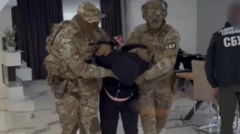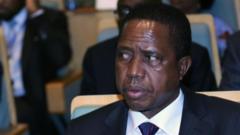The diplomatic rift between Ukraine and Hungary deepens as espionage allegations surface, highlighting Viktor Orban's potential political motivations against the opposition ahead of upcoming elections.
Hungary-Ukraine Relations Deteriorate Amid Espionage Allegations

Hungary-Ukraine Relations Deteriorate Amid Espionage Allegations
Tensions escalate between Ukraine and Hungary as accusations of espionage unfold, revealing political maneuvering by Hungary's Orban government against opposition rivals.
Article Text:
A significant diplomatic crisis has erupted between Ukraine and Hungary, overshadowed by accusations of espionage and political maneuvering as both countries navigate the complexities of a war-torn region. Central to this conflict is Hungary’s Prime Minister, Viktor Orban, who faces criticism for allegedly using the spy controversy to undermine the opposition Tisza party, currently leading in polling ahead of the 2026 elections.
Earlier this month, Ukraine's SBU security service arrested two Ukrainian nationals accused of collaborating with Hungarian military intelligence in espionage activities. These allegations reportedly stem from evidence suggesting they were involved in preparations for military actions on behalf of Hungary. This led to a reciprocal expulsion of diplomats between the two nations, further deteriorating their relations, which have been tense for quite some time.
Orban's government has been heavily criticized for its close ties to Russia, often straying from the unified stance of European Union partners. Despite Hungary's controversial position, Orban condemned Ukraine's actions, accusing Kyiv of attempting to tarnish Hungary’s reputation. Amid this unrest, Hungarian households received a government questionnaire labeled "Vox 2025," soliciting opinions on rejecting Ukraine’s EU membership aspirations.
Just a year ago, Orban attempted to portray Hungary as a mediator for peace, yet he faced backlash for seeking to reward Russian aggression while Ukrainian cities suffered attacks following his visits with Russian President Vladimir Putin. As a response to the worsening diplomatic climate, Peter Magyar, the leader of the Tisza party, provided $40,000 worth of medical aid to a hospital in Kyiv shortly after a missile strike, a move that highlights the contrasting narratives from both political factions within Hungary.
In recent developments, notable figures within the Tisza party, including Roland Tseber, have faced accusations from Fidesz, Orban's governing party, alleging connections to espionage. Despite these claims, Tseber maintains his innocence, asserting he is simply a politician committed to humanitarian work in Ukraine.
The ongoing espionage allegations set a troubling backdrop against a shrinking Hungarian community in Transcarpathia, which has faced tragic losses in the ongoing conflict. As attacks against former military figures aligned with the Tisza party intensify, the political skirmish risks further alienating Hungary’s longstanding historical ties with Ukraine.
In a leaked speech from 2023, Defence Minister Kristof Szalay-Bobrovniczky revealed a shift from a peace-focused strategy to one oriented towards military readiness, marking a critical turning point for a nation struggling to balance its ties with both Russia and its obligations to NATO allies.
A significant diplomatic crisis has erupted between Ukraine and Hungary, overshadowed by accusations of espionage and political maneuvering as both countries navigate the complexities of a war-torn region. Central to this conflict is Hungary’s Prime Minister, Viktor Orban, who faces criticism for allegedly using the spy controversy to undermine the opposition Tisza party, currently leading in polling ahead of the 2026 elections.
Earlier this month, Ukraine's SBU security service arrested two Ukrainian nationals accused of collaborating with Hungarian military intelligence in espionage activities. These allegations reportedly stem from evidence suggesting they were involved in preparations for military actions on behalf of Hungary. This led to a reciprocal expulsion of diplomats between the two nations, further deteriorating their relations, which have been tense for quite some time.
Orban's government has been heavily criticized for its close ties to Russia, often straying from the unified stance of European Union partners. Despite Hungary's controversial position, Orban condemned Ukraine's actions, accusing Kyiv of attempting to tarnish Hungary’s reputation. Amid this unrest, Hungarian households received a government questionnaire labeled "Vox 2025," soliciting opinions on rejecting Ukraine’s EU membership aspirations.
Just a year ago, Orban attempted to portray Hungary as a mediator for peace, yet he faced backlash for seeking to reward Russian aggression while Ukrainian cities suffered attacks following his visits with Russian President Vladimir Putin. As a response to the worsening diplomatic climate, Peter Magyar, the leader of the Tisza party, provided $40,000 worth of medical aid to a hospital in Kyiv shortly after a missile strike, a move that highlights the contrasting narratives from both political factions within Hungary.
In recent developments, notable figures within the Tisza party, including Roland Tseber, have faced accusations from Fidesz, Orban's governing party, alleging connections to espionage. Despite these claims, Tseber maintains his innocence, asserting he is simply a politician committed to humanitarian work in Ukraine.
The ongoing espionage allegations set a troubling backdrop against a shrinking Hungarian community in Transcarpathia, which has faced tragic losses in the ongoing conflict. As attacks against former military figures aligned with the Tisza party intensify, the political skirmish risks further alienating Hungary’s longstanding historical ties with Ukraine.
In a leaked speech from 2023, Defence Minister Kristof Szalay-Bobrovniczky revealed a shift from a peace-focused strategy to one oriented towards military readiness, marking a critical turning point for a nation struggling to balance its ties with both Russia and its obligations to NATO allies.



















